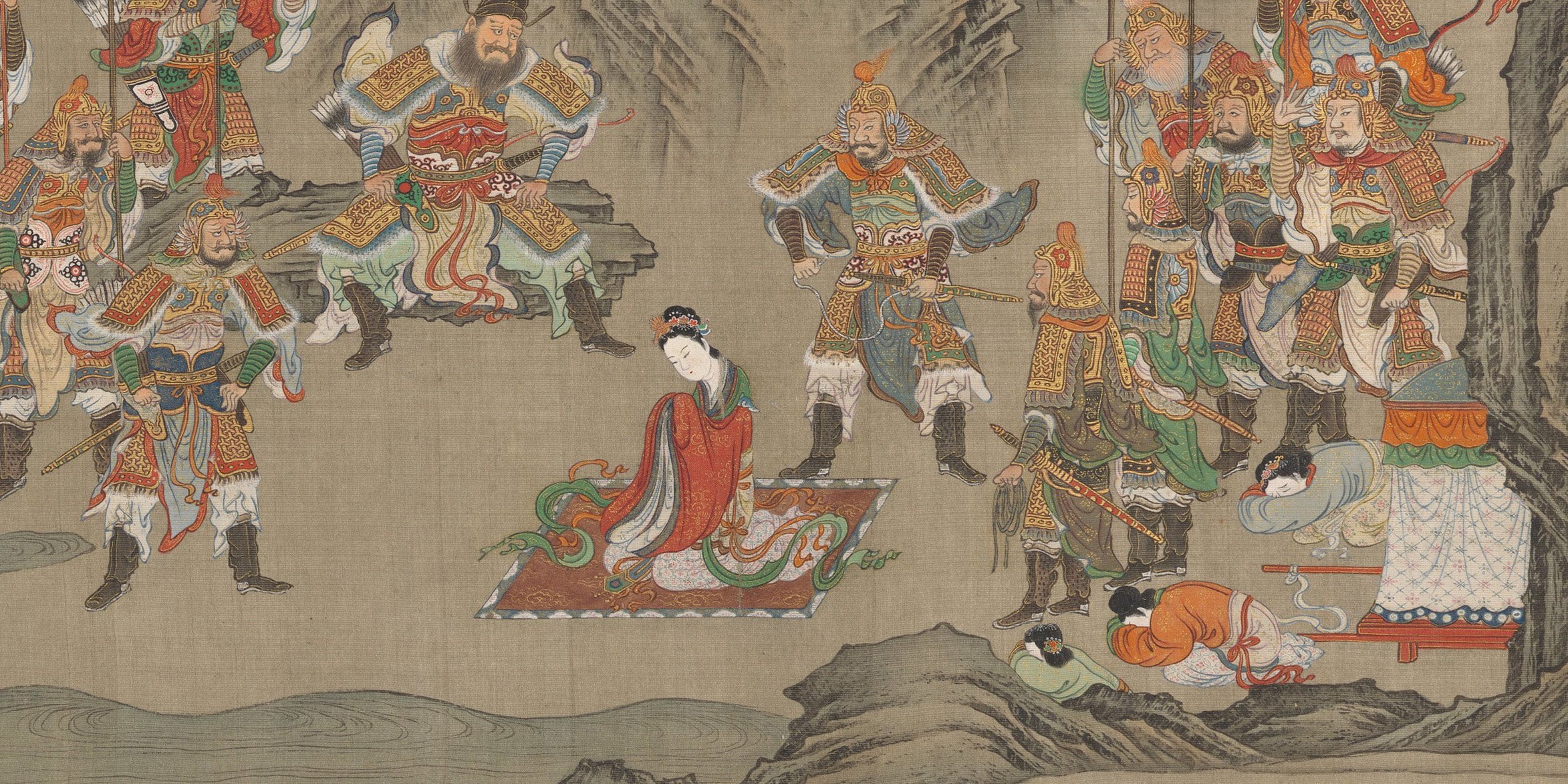
Emperor Xuanzong and Lady Yang (Part 2)
Author: Ching Hsiao, Evan Mantyk
In the later years of Tang Emperor Xuanzong’s reign, the Tang general An Lushan launched a rebellion under the pretext of suppressing Yang Guozhong, Lady Yang’s brother. This marked the beginning of the An Lushan Rebellion and a turning point after which the prosperous Tang Dynasty began to decline. On December 16, 755, An Lushan breached the final barrier to the east of the Imperial capital, Chang'an. Emperor Xuanzong decided to abandon Chang'an and flee to Shu State.
Along the way, the soldiers of the Imperial Army suffered mentally from both homesickness and despair about the future. They also suffered physically from hunger and voiced their grievances; a feeling of discontent swept through their camps. After arriving at Ma Wei Slope and stopping there to rest, General Chen Xuanli called for the execution of Yang Guozhong, who was indeed a treacherous official. Coincidentally, a Tibetan envoy intercepted Yang Guozhong's horse, prompting the soldiers to accuse him of colluding with the Tibetans and plotting treason. Some soldiers volunteered to decapitate Yang Guozhong and were approved.
Upon learning of Yang Guozhong's death, Emperor Xuanzong did not show anger. On the one hand, he knew Yang Guozhong was a corrupt official; though he knew he wouldn't have rebelled, his death was not regrettable. On the other hand, to appease the soldiers and secure his own safety, Emperor Xuanzong couldn't afford to be stubborn in such a dangerous situation. He said to his troops, "Since he has been killed, let's disperse."
Unexpectedly, the Imperial Army remained motionless, staring at Emperor Xuanzong. When he asked why they hadn't dispersed, they replied, "The enemy is still present." Chen Xuanli explained, "Guozhong has rebelled, and Lady Yang should not be honored. Your Majesty, please sever ties and uphold the law." These words pierced Emperor Xuanzong's heart like a thousand arrows.
He hesitated for a long while, unable to bear the thought of executing Lady Yang. However, following Gao Lishi's reminder, Emperor Xuanzong could only sigh helplessly: although Lady Yang was indeed innocent, only by appeasing the soldiers could the Emperor ensure his own safety.
According to historical records, before bidding farewell, Lady Yang said to Emperor Xuanzong, "I hope everyone will live well. I am sincerely indebted to the Empire, and I have no regrets in death." After paying homage to the Buddha, Gao Lishi strangled Lady Yang in the Buddhist hall. "The Song of Everlasting Sorrow" describes this scene of parting:
The flower hairpin of its owner has been depraved;
Its jade and golden birds can only scratch their heads.
The Emperor must hide his face—she can’t be saved.
When looking back, a stream of blood and tears he sheds
In his flight, Emperor Xuanzong reflected on his own negligence and faults. Upon reaching the dangerous pass of Jianmen, he proclaimed to the world, "My own lack of virtue has led to this calamity, causing harm to the realm and failing the people, thus I blame myself." Upon learning that his son, Crown Prince Li Heng, would proclaim himself Emperor, although reluctantly, Emperor Xuanzong prioritized the greater good, and to prevent further internal strife, said, "My son follows the Will of Heaven and the wishes of the people. What need have I to worry?"
Returning to Chang'an, in the final days of his life, Emperor Xuanzong was isolated and confined to the Taiji Palace with no trusted aides by his side. In melancholy solitude and endless longing, he wrote his final reflections: “Carving wood and pulling threads, aging like an old man; with chicken skin and crane hair, true to one's age. In a moment of idle play, all is calm and uneventful, seeming like a living dream.”
His life epitomized the flourishing Tang Dynasty, experiencing the seasons of spring, summer, autumn, and winter—creating remarkable achievements in its vibrant spring, enjoying earthly blessings in its resplendent summer, tasting the vicissitudes of life in its desolate autumn, and ultimately returning to quietness in its lonely winter. Lady Yang arrived by his side during the most flourishing season, and they envisioned a life of unity and harmony. Yet as the spring blossoms fell and time passed, the departed found liberation while the living remained in a dream.
In 2023, Shen Yun Performing Arts presented a dance drama depicting the story of Emperor Xuanzong and Lady Yang. The expressive dancing and captivating music convey the sweet affection of the Chinese saying "as eternal as the heavens, as inseparable as the branches" and the heartbreaking sorrow of "though heaven and earth may pass away, this sorrow will never end." Shen Yun's dazzling interpretation of the story stirs profound reflections on facing the alternate realities of splendor and desolation.
Shen Yun's performance vividly portrays the elderly and now deposed emperor Xuanzong's melancholy longing. The garden is still there, but its appearance has changed; Xuanzong is still there, but with white hair instead of black; everything has changed. In the past, watching the blooming of peach blossoms, his beloved always accompanied him; tonight, with the falling of leaves, swept by the autumn wind, he is left alone in restless melancholy. The moonlight becomes the color of sadness, and the sound of the wind becomes the sound of heartbreak. Emperor Xuanzong's yearning feels like an endless night, and he faintly sees the figure of Lady Yang as if she were coming out of a painting, everything so real yet also like a dream. After waking up, he remains with only white hair, wandering in sorrow, not knowing how many more “slow tolls of the bells and beatings of the drums through the nightly watch” will extend the darkness he must enture. Meanwhile “quietly the stars and rivers approach dawn." After watching the performance by Shen Yun's dancers, the audience seems to linger in the Tang Dynasty era, inebriated by grandeur and beauty.

























